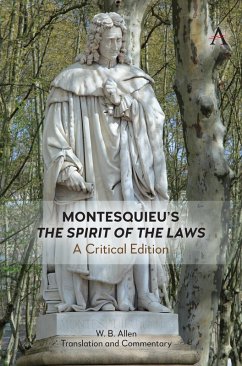Montesquieu's 'The Spirit of the Laws' (eBook, ePUB)
A Critical Edition
54,95 €
54,95 €
inkl. MwSt.
Sofort per Download lieferbar

27 °P sammeln
54,95 €
Als Download kaufen

54,95 €
inkl. MwSt.
Sofort per Download lieferbar

27 °P sammeln
Jetzt verschenken
Alle Infos zum eBook verschenken
54,95 €
inkl. MwSt.
Sofort per Download lieferbar
Alle Infos zum eBook verschenken

27 °P sammeln
Montesquieu's 'The Spirit of the Laws' (eBook, ePUB)
A Critical Edition
- Format: ePub
- Merkliste
- Auf die Merkliste
- Bewerten Bewerten
- Teilen
- Produkt teilen
- Produkterinnerung
- Produkterinnerung

Bitte loggen Sie sich zunächst in Ihr Kundenkonto ein oder registrieren Sie sich bei
bücher.de, um das eBook-Abo tolino select nutzen zu können.
Hier können Sie sich einloggen
Hier können Sie sich einloggen
Sie sind bereits eingeloggt. Klicken Sie auf 2. tolino select Abo, um fortzufahren.

Bitte loggen Sie sich zunächst in Ihr Kundenkonto ein oder registrieren Sie sich bei bücher.de, um das eBook-Abo tolino select nutzen zu können.
The Spirit of the Laws not only systematizes the foundational ideas of "separation of powers" and "balances and checks," it provides the decisive response to the question of whether power in the nation-state can be limited in the aftermath of the Westphalian settlement of 1648. It describes a civilizational change through which power becomes domesticated, with built-in resistance to attempts to absolutize (or make total) political power. As such, it is the Bible of modern politics, now made more accessible to English readers than it ever has been.
- Geräte: eReader
- mit Kopierschutz
- eBook Hilfe
- Größe: 1.89MB
Andere Kunden interessierten sich auch für
![History of the Rise and Influence of the Spirit of Rationalism in Europe (eBook, ePUB) History of the Rise and Influence of the Spirit of Rationalism in Europe (eBook, ePUB)]() William Edward Hartpole LeckyHistory of the Rise and Influence of the Spirit of Rationalism in Europe (eBook, ePUB)2,13 €
William Edward Hartpole LeckyHistory of the Rise and Influence of the Spirit of Rationalism in Europe (eBook, ePUB)2,13 €![Fear and Trembling (eBook, ePUB) Fear and Trembling (eBook, ePUB)]() Søren KierkegaardFear and Trembling (eBook, ePUB)8,49 €
Søren KierkegaardFear and Trembling (eBook, ePUB)8,49 €![Hegel's Philosophy of Spirit (eBook, ePUB) Hegel's Philosophy of Spirit (eBook, ePUB)]() Hegel's Philosophy of Spirit (eBook, ePUB)21,95 €
Hegel's Philosophy of Spirit (eBook, ePUB)21,95 €![The Routledge Guidebook to Hegel's Phenomenology of Spirit (eBook, ePUB) The Routledge Guidebook to Hegel's Phenomenology of Spirit (eBook, ePUB)]() Robert SternThe Routledge Guidebook to Hegel's Phenomenology of Spirit (eBook, ePUB)27,95 €
Robert SternThe Routledge Guidebook to Hegel's Phenomenology of Spirit (eBook, ePUB)27,95 €![The Critique of Practical Reason (eBook, ePUB) The Critique of Practical Reason (eBook, ePUB)]() Immanuel KantThe Critique of Practical Reason (eBook, ePUB)0,99 €
Immanuel KantThe Critique of Practical Reason (eBook, ePUB)0,99 €![The War Delusion: Why We Keep Dying for Nothing? (eBook, ePUB) The War Delusion: Why We Keep Dying for Nothing? (eBook, ePUB)]() Artemis NovaThe War Delusion: Why We Keep Dying for Nothing? (eBook, ePUB)4,99 €
Artemis NovaThe War Delusion: Why We Keep Dying for Nothing? (eBook, ePUB)4,99 €![Nothing Sacred (eBook, ePUB) Nothing Sacred (eBook, ePUB)]() Stathis GourgourisNothing Sacred (eBook, ePUB)29,95 €
Stathis GourgourisNothing Sacred (eBook, ePUB)29,95 €-
-
-
The Spirit of the Laws not only systematizes the foundational ideas of "separation of powers" and "balances and checks," it provides the decisive response to the question of whether power in the nation-state can be limited in the aftermath of the Westphalian settlement of 1648. It describes a civilizational change through which power becomes domesticated, with built-in resistance to attempts to absolutize (or make total) political power. As such, it is the Bible of modern politics, now made more accessible to English readers than it ever has been.
Dieser Download kann aus rechtlichen Gründen nur mit Rechnungsadresse in A, D ausgeliefert werden.
Produktdetails
- Produktdetails
- Verlag: Anthem Press
- Erscheinungstermin: 6. Februar 2024
- Englisch
- ISBN-13: 9781839982965
- Artikelnr.: 63419581
- Verlag: Anthem Press
- Erscheinungstermin: 6. Februar 2024
- Englisch
- ISBN-13: 9781839982965
- Artikelnr.: 63419581
- Herstellerkennzeichnung Die Herstellerinformationen sind derzeit nicht verfügbar.
W. B. Allen studies and writes broadly in political philosophy and history, with special focus on traditions of self-government and liberalism.
Acknowledgments; Translator's Preface; Foreword; THE SPIRIT OF THE LAWS BY
MONTESQUIEU Concerning the Spirit of the Laws; PART ONE, Book One
Concerning Laws in General; Book Two Concerning the Laws Which Derive
Directly from the Nature of the Government; Book Three Concerning the
Principles of the Three Governments; Book Four That Education Laws Ought to
Be Relative to the Principles of the Government; Book Five The Legislator's
Laws Must Be Relative to the Principle of the Government; Book Six
Consequences of the Principles of Different Governments, in Relation to the
Simplicity of Civil and Criminal Laws, the Method of Judgment, and the
Establishment of Penalties; Book Seven Consequences of the Differing
Principles of the Three Governments, in Relation to Sumptuary Laws, Luxury,
and the Status of Women; Book Eight Concerning the Corruption of the
Principles of the Three Governments; PART TWO, Book Nine Concerning the
Laws in the Relation They Have with Defensive Strength; Book Ten Concerning
the Laws in Their Relation to Offensive Force; Book Eleven About Laws Which
Create Political Liberty, in Its Relation to the Constitution; Book Twelve
About the Laws Which Create Political Liberty, in Its Relation to the
Citizen; Book Thirteen About the Relations Which the Levying of Taxes and
the Extent of Public Revenues Hold with Liberty; PART THREE, Book Fourteen
Concerning the Laws, in the Relation They Have with the Climate's Nature;
Book Fifteen How the Laws of Civil Slavery Have Some Relation to the Nature
of the Climate; Book Sixteen How the Laws of Domestic Slavery Have Some
Relation to the Nature of the Climate; Book Seventeen How the Laws of
Political Servitude Are Related to the Nature of the Climate; Book Eighteen
Concerning the Laws, in the Relation Which They Have to the Nature of the
Terrain; Book Nineteen Concerning the Laws in the Relation Which They Have
with the Principles That Create the General Spirit, the Morals, and the
Manners of a Nation ; PART FOUR, Book Twenty About the Laws in the Relation
That They Have with Commerce, Considered in Its Nature and Its
Distinctions; Book Twenty-One About the Laws in the Relation They Have with
Commerce, Considered Under the Revolutions Which There Have Been in the
World; Book Twenty-Two About the Laws in the Relation That They Have with
the Use of Money; Book Twenty-Three About the Laws in the Relation Which
They Have to the Number of Inhabitants; PART FIVE, Book Twenty-Four
Concerning the Laws in the Relation Which They Have to the Religion
Instituted in Each Country, Considered in Its Practices and in Itself; Book
Twenty-Five Laws in Relation to the Religion of Each Country and Its
External Politics; Book Twenty-Six Concerning the Laws in the Relation That
They Have with the Arrangement of Matters over Which They Are Set Up; PART
SIX, Book Twenty-Seven Concerning the Origin and Revolutions of the Roman
Laws on Successions; Book Twenty-Eight Concerning the Origin and
Revolutions of the Civil Laws Among the French; Book Twenty-Nine About the
Manner of Composing the Laws; Book Thirty A Theory of Feudal Laws Among the
Francs in the Relation That They Have with Instituting the Monarchy; Book
Thirty-One A Theory of Feudal Laws Among the Franks, in the Relation That
They Have with the Revolutions in Their Monarchy; THE MIND BEHIND THE LAWS:
THE TRANSLATION OF POWER; Epilogue: Montesquieu and America; Notes;
Bibliography
MONTESQUIEU Concerning the Spirit of the Laws; PART ONE, Book One
Concerning Laws in General; Book Two Concerning the Laws Which Derive
Directly from the Nature of the Government; Book Three Concerning the
Principles of the Three Governments; Book Four That Education Laws Ought to
Be Relative to the Principles of the Government; Book Five The Legislator's
Laws Must Be Relative to the Principle of the Government; Book Six
Consequences of the Principles of Different Governments, in Relation to the
Simplicity of Civil and Criminal Laws, the Method of Judgment, and the
Establishment of Penalties; Book Seven Consequences of the Differing
Principles of the Three Governments, in Relation to Sumptuary Laws, Luxury,
and the Status of Women; Book Eight Concerning the Corruption of the
Principles of the Three Governments; PART TWO, Book Nine Concerning the
Laws in the Relation They Have with Defensive Strength; Book Ten Concerning
the Laws in Their Relation to Offensive Force; Book Eleven About Laws Which
Create Political Liberty, in Its Relation to the Constitution; Book Twelve
About the Laws Which Create Political Liberty, in Its Relation to the
Citizen; Book Thirteen About the Relations Which the Levying of Taxes and
the Extent of Public Revenues Hold with Liberty; PART THREE, Book Fourteen
Concerning the Laws, in the Relation They Have with the Climate's Nature;
Book Fifteen How the Laws of Civil Slavery Have Some Relation to the Nature
of the Climate; Book Sixteen How the Laws of Domestic Slavery Have Some
Relation to the Nature of the Climate; Book Seventeen How the Laws of
Political Servitude Are Related to the Nature of the Climate; Book Eighteen
Concerning the Laws, in the Relation Which They Have to the Nature of the
Terrain; Book Nineteen Concerning the Laws in the Relation Which They Have
with the Principles That Create the General Spirit, the Morals, and the
Manners of a Nation ; PART FOUR, Book Twenty About the Laws in the Relation
That They Have with Commerce, Considered in Its Nature and Its
Distinctions; Book Twenty-One About the Laws in the Relation They Have with
Commerce, Considered Under the Revolutions Which There Have Been in the
World; Book Twenty-Two About the Laws in the Relation That They Have with
the Use of Money; Book Twenty-Three About the Laws in the Relation Which
They Have to the Number of Inhabitants; PART FIVE, Book Twenty-Four
Concerning the Laws in the Relation Which They Have to the Religion
Instituted in Each Country, Considered in Its Practices and in Itself; Book
Twenty-Five Laws in Relation to the Religion of Each Country and Its
External Politics; Book Twenty-Six Concerning the Laws in the Relation That
They Have with the Arrangement of Matters over Which They Are Set Up; PART
SIX, Book Twenty-Seven Concerning the Origin and Revolutions of the Roman
Laws on Successions; Book Twenty-Eight Concerning the Origin and
Revolutions of the Civil Laws Among the French; Book Twenty-Nine About the
Manner of Composing the Laws; Book Thirty A Theory of Feudal Laws Among the
Francs in the Relation That They Have with Instituting the Monarchy; Book
Thirty-One A Theory of Feudal Laws Among the Franks, in the Relation That
They Have with the Revolutions in Their Monarchy; THE MIND BEHIND THE LAWS:
THE TRANSLATION OF POWER; Epilogue: Montesquieu and America; Notes;
Bibliography
Acknowledgments; Translator's Preface; Foreword; THE SPIRIT OF THE LAWS BY
MONTESQUIEU Concerning the Spirit of the Laws; PART ONE, Book One
Concerning Laws in General; Book Two Concerning the Laws Which Derive
Directly from the Nature of the Government; Book Three Concerning the
Principles of the Three Governments; Book Four That Education Laws Ought to
Be Relative to the Principles of the Government; Book Five The Legislator's
Laws Must Be Relative to the Principle of the Government; Book Six
Consequences of the Principles of Different Governments, in Relation to the
Simplicity of Civil and Criminal Laws, the Method of Judgment, and the
Establishment of Penalties; Book Seven Consequences of the Differing
Principles of the Three Governments, in Relation to Sumptuary Laws, Luxury,
and the Status of Women; Book Eight Concerning the Corruption of the
Principles of the Three Governments; PART TWO, Book Nine Concerning the
Laws in the Relation They Have with Defensive Strength; Book Ten Concerning
the Laws in Their Relation to Offensive Force; Book Eleven About Laws Which
Create Political Liberty, in Its Relation to the Constitution; Book Twelve
About the Laws Which Create Political Liberty, in Its Relation to the
Citizen; Book Thirteen About the Relations Which the Levying of Taxes and
the Extent of Public Revenues Hold with Liberty; PART THREE, Book Fourteen
Concerning the Laws, in the Relation They Have with the Climate's Nature;
Book Fifteen How the Laws of Civil Slavery Have Some Relation to the Nature
of the Climate; Book Sixteen How the Laws of Domestic Slavery Have Some
Relation to the Nature of the Climate; Book Seventeen How the Laws of
Political Servitude Are Related to the Nature of the Climate; Book Eighteen
Concerning the Laws, in the Relation Which They Have to the Nature of the
Terrain; Book Nineteen Concerning the Laws in the Relation Which They Have
with the Principles That Create the General Spirit, the Morals, and the
Manners of a Nation ; PART FOUR, Book Twenty About the Laws in the Relation
That They Have with Commerce, Considered in Its Nature and Its
Distinctions; Book Twenty-One About the Laws in the Relation They Have with
Commerce, Considered Under the Revolutions Which There Have Been in the
World; Book Twenty-Two About the Laws in the Relation That They Have with
the Use of Money; Book Twenty-Three About the Laws in the Relation Which
They Have to the Number of Inhabitants; PART FIVE, Book Twenty-Four
Concerning the Laws in the Relation Which They Have to the Religion
Instituted in Each Country, Considered in Its Practices and in Itself; Book
Twenty-Five Laws in Relation to the Religion of Each Country and Its
External Politics; Book Twenty-Six Concerning the Laws in the Relation That
They Have with the Arrangement of Matters over Which They Are Set Up; PART
SIX, Book Twenty-Seven Concerning the Origin and Revolutions of the Roman
Laws on Successions; Book Twenty-Eight Concerning the Origin and
Revolutions of the Civil Laws Among the French; Book Twenty-Nine About the
Manner of Composing the Laws; Book Thirty A Theory of Feudal Laws Among the
Francs in the Relation That They Have with Instituting the Monarchy; Book
Thirty-One A Theory of Feudal Laws Among the Franks, in the Relation That
They Have with the Revolutions in Their Monarchy; THE MIND BEHIND THE LAWS:
THE TRANSLATION OF POWER; Epilogue: Montesquieu and America; Notes;
Bibliography
MONTESQUIEU Concerning the Spirit of the Laws; PART ONE, Book One
Concerning Laws in General; Book Two Concerning the Laws Which Derive
Directly from the Nature of the Government; Book Three Concerning the
Principles of the Three Governments; Book Four That Education Laws Ought to
Be Relative to the Principles of the Government; Book Five The Legislator's
Laws Must Be Relative to the Principle of the Government; Book Six
Consequences of the Principles of Different Governments, in Relation to the
Simplicity of Civil and Criminal Laws, the Method of Judgment, and the
Establishment of Penalties; Book Seven Consequences of the Differing
Principles of the Three Governments, in Relation to Sumptuary Laws, Luxury,
and the Status of Women; Book Eight Concerning the Corruption of the
Principles of the Three Governments; PART TWO, Book Nine Concerning the
Laws in the Relation They Have with Defensive Strength; Book Ten Concerning
the Laws in Their Relation to Offensive Force; Book Eleven About Laws Which
Create Political Liberty, in Its Relation to the Constitution; Book Twelve
About the Laws Which Create Political Liberty, in Its Relation to the
Citizen; Book Thirteen About the Relations Which the Levying of Taxes and
the Extent of Public Revenues Hold with Liberty; PART THREE, Book Fourteen
Concerning the Laws, in the Relation They Have with the Climate's Nature;
Book Fifteen How the Laws of Civil Slavery Have Some Relation to the Nature
of the Climate; Book Sixteen How the Laws of Domestic Slavery Have Some
Relation to the Nature of the Climate; Book Seventeen How the Laws of
Political Servitude Are Related to the Nature of the Climate; Book Eighteen
Concerning the Laws, in the Relation Which They Have to the Nature of the
Terrain; Book Nineteen Concerning the Laws in the Relation Which They Have
with the Principles That Create the General Spirit, the Morals, and the
Manners of a Nation ; PART FOUR, Book Twenty About the Laws in the Relation
That They Have with Commerce, Considered in Its Nature and Its
Distinctions; Book Twenty-One About the Laws in the Relation They Have with
Commerce, Considered Under the Revolutions Which There Have Been in the
World; Book Twenty-Two About the Laws in the Relation That They Have with
the Use of Money; Book Twenty-Three About the Laws in the Relation Which
They Have to the Number of Inhabitants; PART FIVE, Book Twenty-Four
Concerning the Laws in the Relation Which They Have to the Religion
Instituted in Each Country, Considered in Its Practices and in Itself; Book
Twenty-Five Laws in Relation to the Religion of Each Country and Its
External Politics; Book Twenty-Six Concerning the Laws in the Relation That
They Have with the Arrangement of Matters over Which They Are Set Up; PART
SIX, Book Twenty-Seven Concerning the Origin and Revolutions of the Roman
Laws on Successions; Book Twenty-Eight Concerning the Origin and
Revolutions of the Civil Laws Among the French; Book Twenty-Nine About the
Manner of Composing the Laws; Book Thirty A Theory of Feudal Laws Among the
Francs in the Relation That They Have with Instituting the Monarchy; Book
Thirty-One A Theory of Feudal Laws Among the Franks, in the Relation That
They Have with the Revolutions in Their Monarchy; THE MIND BEHIND THE LAWS:
THE TRANSLATION OF POWER; Epilogue: Montesquieu and America; Notes;
Bibliography







